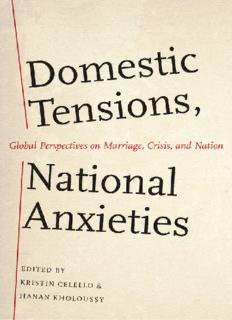
Domestic Tensions, National Anxieties: Global Perspectives on Marriage, Crisis, and Nation PDF
Preview Domestic Tensions, National Anxieties: Global Perspectives on Marriage, Crisis, and Nation
Domestic Tensions, National Anxieties Domestic Tensions, National Anxieties Global Perspectives on Marriage, Crisis, and Nation Edited by Kristin Celello and Hanan KHoloussy 1 1 Oxford University Press is a department of the University of Oxford. It furthers the University’s objective of excellence in research, scholarship, and education by publishing worldwide.Oxford is a registered trade mark of Oxford University Press in the UK and certain other countries. Published in the United States of America by Oxford University Press 198 Madison Avenue, New York, NY 10016, United States of America. © Oxford University Press 2016 All rights reserved. No part of this publication may be reproduced, stored in a retrieval system, or transmitted, in any form or by any means, without the prior permission in writing of Oxford University Press, or as expressly permitted by law, by license, or under terms agreed with the appropriate reproduction rights organization. Inquiries concerning reproduction outside the scope of the above should be sent to the Rights Department, Oxford University Press, at the address above. You must not circulate this work in any other form and you must impose this same condition on any acquirer. Library of Congress Cataloging-in-Publication Data Domestic tensions, national anxieties: global perspectives on marriage, crisis, and nation / edited by Kristin Celello and Hanan Kholoussy. pages cm Includes index. ISBN 978–0–19–985674–9 (hardcover: alk. paper) — ISBN 978–0–19–985673–2 (pbk. : alk. paper) 1. Marriage—Social aspects—History. 2. Social problems. 3. Crises. 4. Civilization, Modern. I. Celello, Kristin. II. Kholoussy, Hanan. HQ519.D637 2016 306.81—dc23 2015018908 9 8 7 6 5 4 3 2 1 Printed by Sheridan, USA For our sons Contents Acknowledgments ix Contributors xi Introduction: Global Perspectives on Marriage, Crisis, and Nation 1 Kristin Celello and Hanan Kholoussy 1. Marital Choice and Marital Crisis in Late Imperial Russia 16 Barbara Alpern Engel 2. Marriage, Manumission, and Morality in Turn- of- the- Century Rio de Janeiro 37 Erica M. Windler 3. Marriage Crisis and All That Jazz 49 Nancy F. Cott 4. Marriage and Minority: The Indian Nation, the Muslim Question, and the Child Marriage Restraint Act of 1929 67 Ishita Pande 5. Mixed Marriage in Colonial Burma: National Identity and Nationhood at Risk 89 Tin Tin Htun 6. Materialism, Contention, and Rebellion: The Changing Demands on Marriage in Colonial Zanzibar 108 Elke E. Stockreiter viii CONTENTS 7. Finding a Grand Amour in Marriage in Postwar France 126 Rebecca J. Pulju 8. Wedding Marriage to the Nation- State in Modern China: Legal Consequences for Divorce, Property, and Women’s Rights 147 Ke Li and Sara L. Friedman 9. Woman- to- Woman, Polyandrous, and Child Marriage: Expressions and Contestations of Marriage Rights in Colonial and Independent Nigeria 170 Nwando Achebe 10. What Kind of Crisis? Marriage and Masculinity in Contemporary Iranian Cinema 192 Amy Motlagh 11. Marriage and Family in Crisis in Contemporary Japan 212 Jeff Kingston 12. Imagined Crises: Assessing Evidence of Delayed Marriage and Never- Marriage in Contemporary Egypt 231 Rania Salem Selected Readings 255 Index 267 Acknowledgments Domestic Tensions, National Anxieties began as a conversation between a historian of the United States and a historian of Egypt. We had both recently published books, one arguing that early twentieth- century fears about increasing divorce rates had led to new ways of talking about marriage and promoting marital success in America, the other that a perceived rejection of marriage by middle- class men in the same time period had served as a repository for intense debates about the formation and direction of a newly modern Egyptian nation. Each work identified and analyzed a significant “marriage crisis,” interro- gating its roots, manifestations, and outcomes. While the American and Egyptian crises were dissimilar in important ways, the differ- ences paled in comparison to larger commonalities. The existence of a sense of crisis specifically inspired by shifting marriage discourses and norms, as well as larger socioeconomic and political events, sug- gested significant parallels between the two cases and raised ques- tions that demanded further investigation. This book is the result of our effort to explore the relationship between marriage, crisis, and the nation on a global, interdisciplinary scale. We would like to thank Kristina Richardson, Kristin’s colleague at Queens College, who first alerted us to one another’s work. Susan Ferber at Oxford University Press has offered invaluable guidance from the inception of this project and through its many “crises” along the way. We are grateful to the scholars who kindly responded
Description: